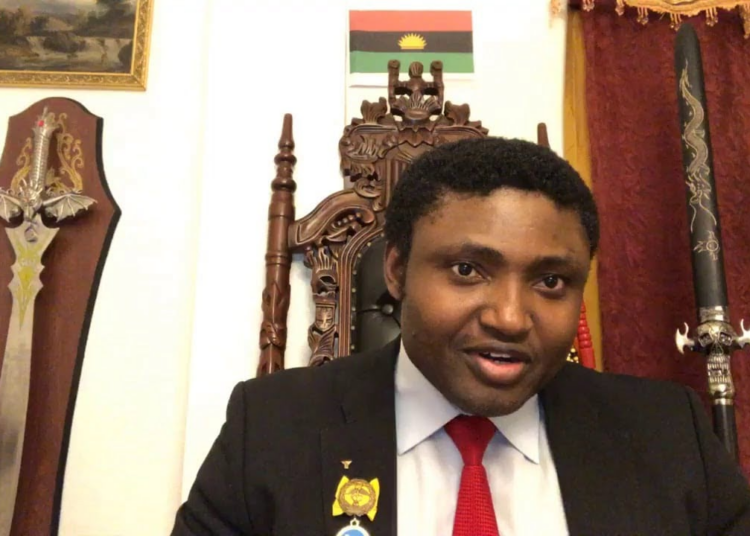The recent conviction of Simon Ekpa in Norway is a major lesson for Nigeria’s sluggish judicial system and renews the call for the expeditious investigation and prosecution of suspects.
Ekpa, a self-styled Biafra separatist agitator based in Finland, was engaged in broadcasting incendiary messages that incited violence in South-East Nigeria. The fact that it took just 10 months to conclude his trial and jail him for terror-related activities and tax fraud speaks volumes about the European country’s justice system—one that values efficiency, fairness, and national security.
This development serves as a powerful wake-up call for Nigeria—particularly when juxtaposed with the protracted and seemingly endless trial of Nnamdi Kanu, the detained leader of the Indigenous People of Biafra (IPOB).
Following his arrest and extradition to Nigeria in June 2021, Kanu’s trial has dragged on dogged by adjournments and legal gymnastics, with lawyers raising all manner of frivolous technicalities to prolong proceedings. In an interview, one of Kanu’s lawyers stated that the government has brought eleven amendments to the charges filed against the IPOB leader. In Ekpa’s case, Norwegian investigators thoroughly inquired into his activities, visiting Nigeria to collect relevant evidence before putting him on trial and securing a conviction within 10 months. Conversely, in Nigeria, prosecutorial agencies often put suspects on trial before gathering sufficient evidence, resulting in prolonged detention and trial.
This is why the awaiting trial inmates (ATIs) phenomenon remains a scar on Nigeria’s justice system. According to August 2025 data from the Nigerian government, approximately 67 per cent of inmates in Nigerian correctional facilities are awaiting trial, many of whom have not seen the inside of a courtroom for several years.
Similarly, hundreds of suspected terrorists arrested in connection with Boko Haram, Islamic State West Africa Province (ISWAP), Ansaru, and other insurgent groups remain in detention for years without conviction. In fact, many high-profile terror suspects were, regrettably, among those who escaped during various jailbreaks. A coordinated attack by ISWAP, for example, led to the escape of 879 inmates, including 64 of the most dangerous terrorists.
In 2022, reports emerged that over 400 terror suspects had been quietly released due to “lack of evidence” after years in custody without proper prosecution. This is not justice; it is administrative negligence that undermines national security. Every day that suspected terrorists languish in indefinite detention, the state loses moral authority, and the rule of law is weakened.
Nigeria must learn from Ekpa’s speedy trial in Norway. Delays in adjudication do much to erode public confidence in the Nigerian judiciary.
Our country faces multiple internal security crises—terrorism in the North-East, banditry in the North-West, separatist agitations in the South-East, and widespread kidnappings. The slow pace of justice has meant that dangerous elements are either emboldened by the lack of consequences or enabled to manipulate the system through legal delay tactics.
Since his re-arrest in 2021, Nnamdi Kanu’s trial has symbolised everything wrong with Nigeria’s criminal justice system. Endless adjournments, conflicting court rulings, and the failure of security agencies to comply with bail orders or court directives have turned what should be a transparent legal process into political drama. Dragging his case on for years only fuels conspiracy theories, deepens ethnic mistrust, and perpetuates the belief that the Nigerian state is either incompetent or selectively punitive.
Contrast that with the swift prosecution of Simon Ekpa in Norway—a man whose alleged influence on violence in Nigeria seems distant from European soil. If they can act with resolve to neutralise threats abroad, how much more should Nigeria be able to address threats within its own borders?
The lesson from Simon Ekpa’s conviction is not merely about speed but institutional will. Norway has demonstrated that no individual—regardless of location or ideology—is beyond the reach of justice. Nigeria must do the same.
The hue and cry over an ineffective and inefficient justice delivery system has been loud and long. However, the problem persists. As a newspaper, we dare say that Nigeria’s democracy cannot thrive on a malfunctioning judiciary that does not inspire public confidence.
Hence, judicial reform is a must to minimise adjournments and close legal loopholes. Prosecutors and judges also need proper funding and training. The judiciary must demonstrate political neutrality in sensitive trials, ensuring that cases like Kanu’s are treated as legal matters, not political ones. To reduce drudgery, court processes must be digitalised to improve efficiency and tracking.
Until Nigeria embraces a fast, fair, and fearless justice system, it will continue to struggle with insecurity, impunity, and public disillusionment. Ekpa’s conviction abroad, while satisfying to many Nigerians, should never have been necessary. Nigeria must reclaim its ability to enforce its own laws within its own territory—and to do so with both speed and justice. Justice delayed, they say, is justice denied.





